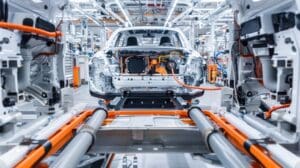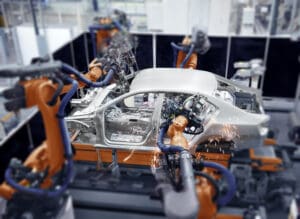China’s electric vehicle (EV) manufacturers are rapidly expanding into Europe, offering cheaper, faster-to-market, and technologically advanced cars – a combination that threatens to disrupt the continent’s traditional automotive giants.
Brands such as Zeekr, a premium EV maker owned by Geely, are already selling in several European countries and plan to enter the UK within two years. Zeekr’s highly automated plants, vertical integration, and proprietary battery and software technology give it an edge over legacy carmakers hampered by complex supply chains, internal silos and slower development cycles.
“All new cars sold in the UK and EU must be zero-emission by 2035, and Europe’s car industry is under huge pressure to adapt,” says Professor Peter Wells, director of the Centre for Automotive Industry Research at Cardiff University. “Chinese firms are nimble, fast and technologically advanced – especially in software, where European firms have struggled.”
Last year, Europe registered almost two million fully electric cars, but price, charging infrastructure and consumer hesitation remain challenges. While European manufacturers such as Jaguar Land Rover, Nissan, Volkswagen, and Renault are retooling for an electric future, analysts warn they are a decade behind China in both production capacity and supply chain control for critical battery minerals.
Andy Palmer, former Aston Martin CEO and ex-Nissan executive, says tariffs are a short-term fix that could leave Europe further behind: “Tariffs insulate the baby, so the baby never learns to walk. The price of entry for Chinese brands should be localisation – build here, employ here, invest here.”
He points to Nissan’s Sunderland plant as proof that local manufacturing can create strong automotive ecosystems. “The UK has clout as Europe’s second-largest EV market. We should use it,” Palmer argues.
Chinese EV makers have focused on compact, efficient, and affordable cars – such as Nio’s soon-to-launch Firefly – while European brands have pushed larger, more expensive SUVs. Wells says this mismatch risks ceding the mass market to Chinese rivals.
The EU has imposed tariffs of up to 45% on some Chinese EV imports, but member states are divided: Germany fears retaliation against its exports to China, while France and Italy back stronger trade barriers. Chinese firms are already exploring tariff workarounds, including shifting production to Turkey.
Analysts say Europe must prioritise innovation, affordability and strategic alliances over trade barriers. Al Bedwell at GlobalData believes Chinese brands will take around 15% of Europe’s all-electric market by the mid-2030s – significant, but “not an existential threat”.
“Europe can’t compete on cost, but it has brand recognition, dealer networks and after-sales service that take time to build,” Bedwell says. “Some Chinese brands have entered markets without understanding local customer preferences.”
Partnerships are already emerging – Stellantis has invested in Leapmotor, while BMW and Audi have signed joint projects with Chinese firms.
Felipe Munoz, an automotive analyst in Turin, says Europe’s high costs and complex regulations are a handicap: “These rules were designed when China wasn’t a player. We need lower taxes, less red tape and more R&D incentives.”
Palmer remains cautiously optimistic: “We have a once-in-a-generation chance to reset Europe’s automotive industry. If we act wisely – and quickly – Europe can still lead in EVs. If we rely on tariffs and delay tough decisions, we’ll face terminal decline.”


















